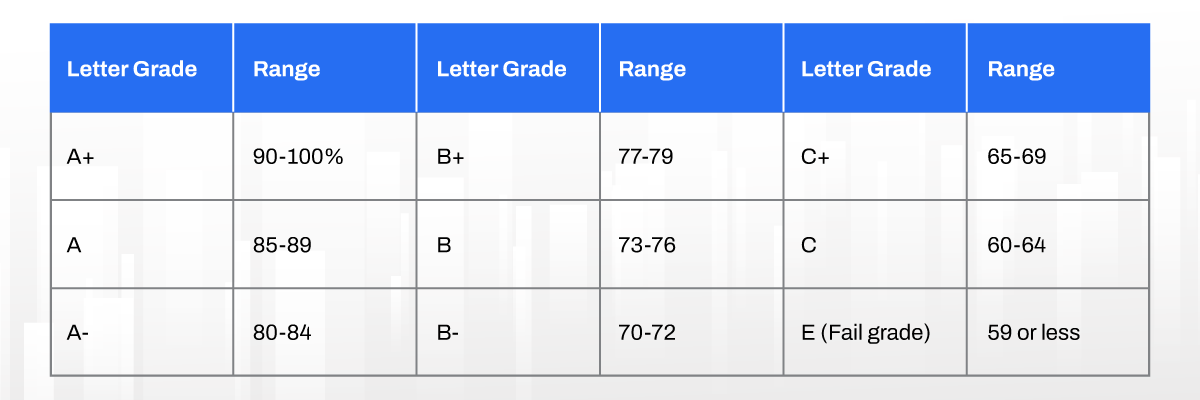Academic Regulations
The grade you receive at the end of each course is expressed as a letter with a numerical equivalent on a scale of 4.3 (Canadian system). The following table shows the numerical equivalences:

To complete the program successfully, you must pass all courses. To pass a course, you must obtain a grade of at least C (2.0 out of 4.3).
Notes:
- If your academic average grade falls below 2.7 out of 4.3 (B-) you will be excluded from the program. You can apply for readmission to the program 5 years after having been excluded.
- You are, however, allowed to receive a failing grade (E, or 0.0 out of 4.3) in one course. If you fail a course, you must take it again as soon as possible. If you fail a second course, you will be temporarily removed from the program, even if you took again and passed the first course that you had failed previously.
- If you fail (grade E) more than one course – including a course already failed, but taken again and passed – your exclusion from the program will be one year if your average is at least 2 7 / 4.3. If the average is below 2.7 / 4.3 the exclusion is 5 years.
Evaluation of students’ performance is based on individual work or exams and a group assignment. Total marks assigned for individual work or exams must account for at least 50% of a student’s final grade. In most courses, individual work includes one or more in-class tests and the group assignment consists of a course project.
Students must achieve at least 60% in their individual work to pass the course, whatever mark they are given for the group project. This requirement ensures that students cannot pass a course based solely on the work of the other students in their project team.
Any student who is found guilty of an academic offense may be expelled from the program. Any form of cheating, such as plagiarism, fraud, copying, falsifying documents, or creating false documents, constitutes an academic offense. Such actions not only are unfair to students who behave honestly, but also detract from the quality of the education, the learning process, and the value of the diploma of the students who commit these offenses.
Academic offenses can take a variety of forms, including:
- Identity theft
- Plagiarism
- Self-plagiarism (turning in the same work for two different courses)
- Illegal possession of examination questions or answers
- Use of unauthorized materials during an exam
- Copying from someone else’s exam paper
- Obtaining any kind of unauthorized assistance
- Obtaining an undeserved favorable evaluation through corruption, blackmail, or intimidation
- Falsifying a document or creating a false document
- Falsifying research data in an assignment.
In order to complete the course, students are required to:
- Complete 45 credits
- Grade Point Average (GPA) of at least 2.7 out of 4.3
- Maximum candidature of 24 months